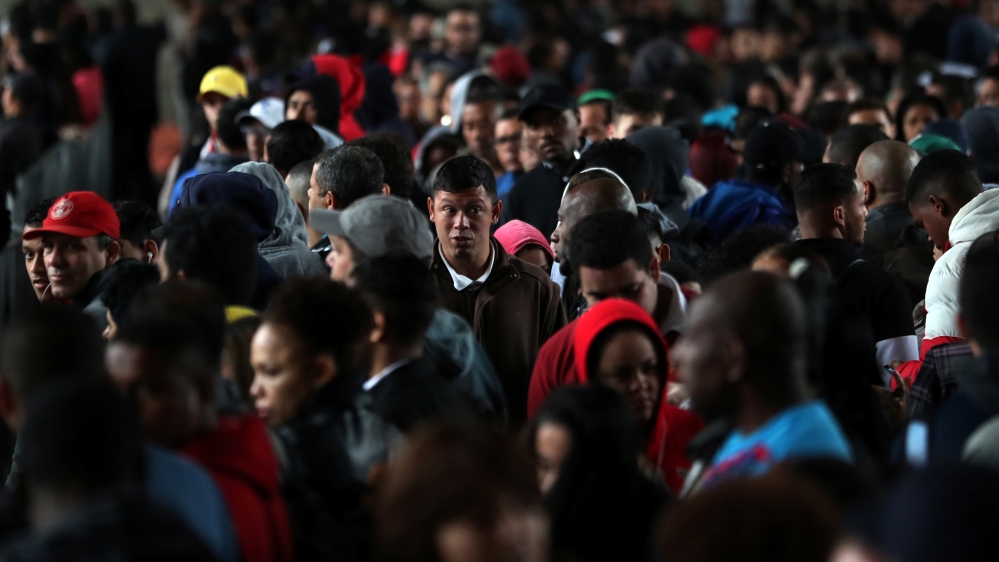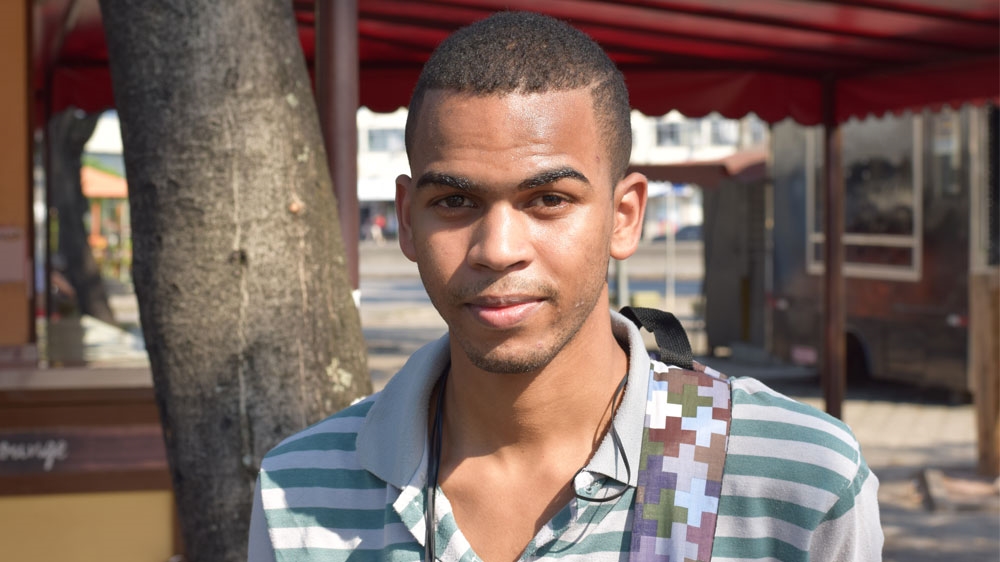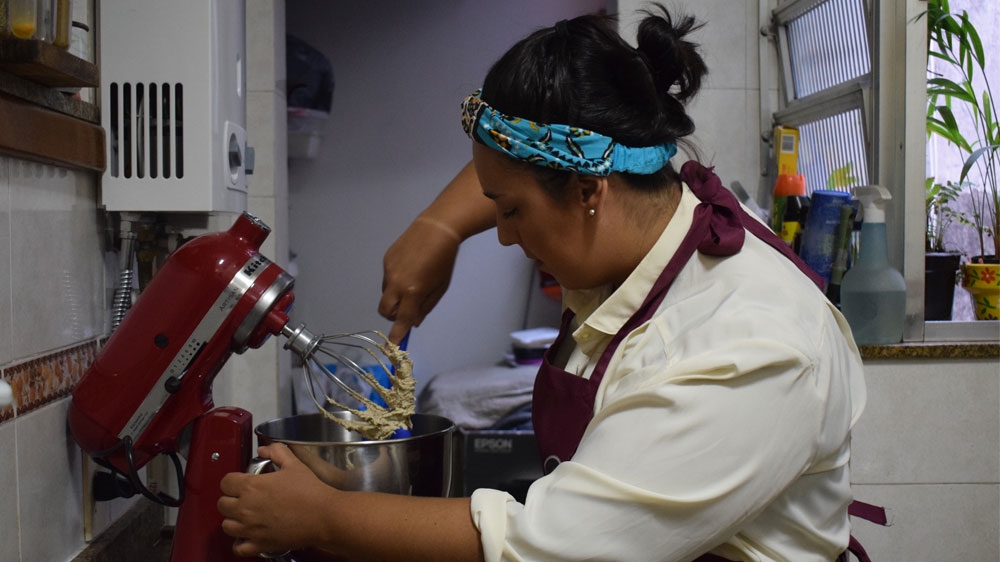Brazil: Youth struggle through economic crisis as election looms
Rio de Janeiro, Brazil – Sitting in a small and airless living room on the edge of northern Rio de Janeiro’s winding Acari favela, Christian Lucas Fonseca’s mother says she is worried.
“There’s no opportunity for young people,” Paula Lucas Fonseca, 45, says.
“It’s very difficult … and a lot of mothers have lost hope because they can’t control it [their children’s future].”
Christian left school prematurely nearly a year ago after missing too many classes. He has since faced the daunting prospect of trying to find work amid the sparse opportunities in Brazil’s stuttering economy.
For now, like millions of other young Brazilians, 18-year-old Christian is unemployed in a country suffering from an economic hangover that followed its worst recession in recorded history.
Unemployment within the general population stands at above 12 percent, according to the Brazilian Institute of Geography and Statistics (IBGE), but among those aged 18-24 the jobless rate leaps to 26.6 percent.
“I’m trying to find work but I’m feeling very unmotivated. I keep going after it but it doesn’t work out,” Christian says, adding that he aspires to go into the army and “move up through the ranks”.
And with elections looming, one of the pressing issues concerning young voters regardless of who wins is ensuring there are more jobs and other opportunities.
‘Youth lost the most’
Brazil’s recession, which began in mid-2014, saw the economy contract sharply from 2015-2016, shrinking by nearly eight percent.
Economists speculate the downturn was linked to a variety of factors, including a fall in the global commodity prices, which had previously fuelled an economic boom in Brazil from 2000-2012, domestic fiscal decision-making and several high-level corruption scandals that prompted market uncertainty.
What is clear, however, is that the biggest losers during the slump were young people, according to Macelo Cortes Neri, head of the Center for Social Research at the Getulio Vargas Foundation (FGV) higher education institute.
“The youth lost the most right from the beginning of the crisis,” Neri says, pointing to significant falls in income rates among people aged 15-24 in the four years after 2014 compared to the overall population.
“[And] this crisis is deep and long and has a very long and shy recovery process.”
 |
| More than 12 percent of Brazilians are jobless, according to the Brazilian Institute of Geography and Statistics [File: Paulo Whitaker/Reuters] |
Despite growing modestly again last year, the Brazilian economy remains in fragile health and weak growth is prompting little optimism from young Brazilians about theire future prospects.
According to the National Confederation of Brazilian Industry, fear of unemployment peaks at 68.6 percent among those aged 16-24 and falls through every older age group until 55 and above.
Since September 2017, around the time Brazil officially exited recession, the number has risen by three percent.
Educational divides
Inextricable from prospects for employment is education.
More than 21 percent of Brazilians who fail to finish high school are jobless, according to IBGE.
Unemployment among those who complete university studies, by comparison, is 6.3 percent
Wellington Costa, 19, from underprivileged northern Rio’s Iraja neighbourhood is hoping to transition from the former group into the latter.
He’s trying to finish high school and plans to go proceed on to university to study engineering.
But he’s currently having to balance his schooling with odd jobs, commonly known in Brazil as “be cools”, in order to make money to support his family.
“I feel unsatisfied, it sucks, but I need to keep doing what I must to survive,” Wellington, who’s dreamed of making submarines since the age of five, says.
“My financial situation has always been like this, independent of whatever the government is or whether there’s a recession or not,” he adds.
“The people writing about unemployment and putting together the data are all in good financial condition and don’t really think about how things are affecting the poorer, working classes.”
 |
| Aspiring engineer Wellington Costa, 19, is balancing education with work [David Child/Al Jazeera] |
According to Neri, Brazilian officials could do more to support young people like Wellington through school and in finding jobs.
“In terms of education policy, everything after high school is about going to unviersity, but only a few go to university,” Neri says.
“We don’t have an agenda for the young in terms of professional education … [and] youth becomes a problem when it should be the solution [for the economy].”
Squeezed middle class
Even those who have undertaken higher education, however, have not been immune from Brazil’s economic crisis.
About 30km south of Acari, in the tree-lined avenues of the largely middle class Botafogo neighbourhood, sisters Aline and Leticia Domingues da Rosa, both graduates of the Rio-based prestigious, private Pontifical Catholic University, are also feeling the effects of the downturn and a subsequent slow and stuttering recovery.
Leticia, 27, was laid-off from her job at a radio station last year as part of severe cutbacks.
Along with Aline, 28, she now runs a home-made baking business producing cookies, cakes and other confectionary.
The enterprise has leaned on financial support from the wider family and the sisters’ own savings.
Neither express any confidence they will be able to find work if the business fails to get off the ground.
“The end of the recession won’t be felt yet, in the long run things might get better but at the moment I don’t see anything getting better,” Leticia says.
“If I had the money I would leave Brazil in a heartbeat.”
 |
| Aline Domingues da Rosa, 28, sells cookies, cakes and other confectionary [David Child/Al Jazeera] |
Half of all Brazilians aged between 25-34 would like to change countries if they could, according to a survey published by polling institute Datafolha in June.
Among those 16 to 24 years old, the number rises 62 percent.
Election approaching
The disenchantment that has seemingly gripped many young Brazilians comes as the country is set to vote on Sunday as part of national and state-level elections.
At stake are more than 1,650 positions, including the presidency.
Presidential frontrunner candidates far-right Jair Bolsonaro and leftist Workers’ Party contender Fernando Haddad, who replaced former widely popular former president Luiz Inacio “Lula” da Silva last month after he was barred from running in the vote, have presented widely different proposals for kick-starting Brazil’s economy.
Bolsonaro, a former army captain, has pledged to cut red tape and minimise the size of the state via privatisation.
Haddad, a former mayor of metropolis Sao Paulo and minister of education under Lula, has vowed to cut taxes for Brazil’s lowest earners and boost employment.
Despite leading opinion polls in the run-up to Sunday’s vote, both also have high rejection rates among the electorate.
Costa is one of a number of Brazilians not convinced by either candidate.
“The election doesn’t have much of an impact on me, things are bad and difficult regardless of who wins, so I’m going to vote null,” he says.
For Leticia, meanwhile, “none of the candidates present a solution” for the economy.
But in Acari, where a light flickers momentarily and then sparks into life following a power cut, Christian speaks with aspiration about the future.
“I don’t know much about politics, and I don’t know who would be the best politician … [But] I hope things will get better after the election,” Christian, who didn’t register to vote, says.
“I want a permanent, fixed job. That’s how I will be able to go up in life.”




